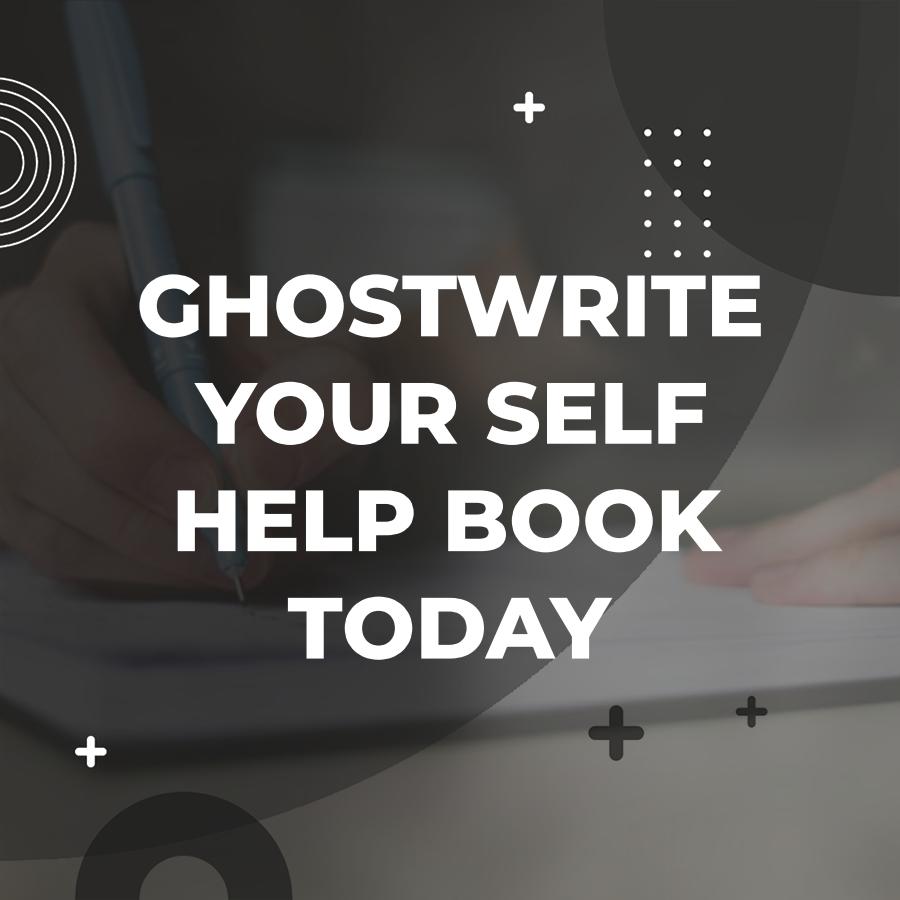Many experts and aspiring authors want to share their knowledge through self-help books, but often struggle to find the time or the right words to express their insights. Ghostwriting becomes essential in these scenarios.
A self-help book ghostwriter is someone who writes your book for you, capturing your voice and ideas while you focus on what you do best. Let’s explore how this works and the many dimensions a self-help ghostwriter can address.
Table of Contents
Understanding the Role of a Ghostwriter
Ghostwriters are often the unsung heroes of publishing. They take on the heavy lifting of writing while allowing the original author to maintain credit and ownership of the work. This symbiotic relationship benefits both parties, especially the self-help books.
Take, for instance, a busy corporate coach whose advice on leadership could fill volumes. With their expertise and experience, they might have a plethora of ideas, but finding the time or energy to transform those ideas into a coherent book could be a challenge. A ghostwriter can step in to create a well-structured narrative, develop actionable insights, and imbue the text with a voice that resonates with readers.
Choosing the Right Ghostwriter
The selection process demands careful thought. Some writers stand out more than others, particularly in self-help topics. Here’s what to consider:
Expertise in the Genre
A ghostwriter with experience in self-help knows how to craft motivational content that connects with readers. They understand the nuances of self-improvement themes, frameworks for personal growth, and how to engage with the audience. For instance, a ghostwriter familiar with the psychology behind habit formation can be more effective in conveying strategies for implementing change.
Writing Style
Every author has a unique voice. A ghostwriter’s ability to mimic that voice is crucial. Suppose an author writes with a tone that is warm and conversational. Then, their ghostwriter should be able to replicate that style seamlessly. In one case, a psychologist had worked with a ghostwriter who successfully captured her approachable style while retaining the authority she needed to convey complex psychological principles. The result was a book that felt genuine and relatable to readers.
Previous Work
Assess a ghostwriter’s portfolio. It’s essential to review samples of their previous work, preferably in the self-help genre. This approach not only showcases their writing ability but also gives insight into how they handle various topics. A writer who can adeptly shift between storytelling, actionable advice, and experiential anecdotes is worth considering.
The Process of Collaborating with a Ghostwriter
Working with a ghostwriter is more than just hiring someone to write down your thoughts. It involves collaboration and communication to ensure that the final product aligns with your vision.
Initial Consultation
First, you’ll hold consultations to discuss ideas, themes, and goals for the book. A good ghostwriter asks probing questions to truly understand your philosophy, target audience, and what you wish to achieve with your book. For example, an author addressing anxiety management might focus on their personal journey and practical solutions that helped them, guiding the ghostwriter to center on those experiences when writing the narrative.
Outline Creation
After sketching the ideas, the ghostwriter can create a detailed outline of the book, breaking it down into chapters and key points. This stage is vital because it serves as a roadmap, ensuring that the book flows logically from one concept to the next. For example, a book on developing emotional intelligence might follow a path from self-awareness to relationship skills, with each chapter dedicated to exploring those concepts.
Drafting and Feedback
The drafting process begins with the ghostwriter writing a draft based on the agreed outline. After the initial draft is complete, the author will review it for tone, accuracy, and completeness. Feedback loops between the ghostwriter and the author during this phase are critical. The more specific the feedback, the better the final product will align with your vision.
Final Edits and Revisions
Once the author and ghostwriter are satisfied with the draft, the document proceeds to the final editing phase. During this stage, minor tweaks and rewordings happen to enhance clarity and readability. Depending on the complexity of the material, some ghostwriters may even recommend arranging for a professional editor to ensure the final copy meets publishing standards.
Navigating Challenges in Ghostwriting
Like any collaboration, ghostwriting presents different challenges. Understanding these can set realistic expectations.
Voice Consistency
Maintaining the author’s voice throughout a book can be tricky, especially if the ghostwriter attempts to infuse their own style. This issue often surfaces in lengthy manuscripts. Regular check-ins and revisions help ensure that your unique voice remains intact.
Conceptual Clarity
Sometimes, authors have various ideas swirling in their heads, which can lead to confusion during the writing process. A skilled ghostwriter can help organize these thoughts. However, if not articulated clearly, the project may veer in a different direction. Clear communication about goals and specific points is critical for success.
Time Constraints
Ghostwriters often juggle multiple projects. Depending on their schedules, timelines could shift, which may cause stress for the author. Setting deadlines and updating regularly can mitigate potential delays.
Financial Considerations
When it comes to hiring a ghostwriter for a self-help project, it’s essential to recognize the costs that accompany this valuable service.
Payment Models
Ghostwriters typically work under different payment models. Some may require an upfront fee, others prefer sales-based earnings, and some a combination of both. Upfront payment can range significantly based on the writer’s experience and reputation. For example, a seasoned ghostwriter with a strong portfolio may charge thousands for a manuscript. Meanwhile, a newcomer may offer more budget-friendly options.
Budgeting
It’s crucial to establish a clear budget from the outset. Consider how much you are willing to invest in your book project. Those figures will shape the type of ghostwriters you can attract. Opting for an experienced ghostwriter often ensures high-quality work, yet this route usually comes with higher costs.
Return on Investment
When estimating the financial aspect of hiring a ghostwriter, consider the potential return on investment. A well-crafted self-help book can become a significant revenue source through book sales, speaking engagements, and consulting. Many famous authors began as clients of ghostwriters, exhibiting the value of this partnership.
Marketing and Promotion Strategies
After completing the book, marketability becomes crucial. A ghostwriter may offer assistance in planning marketing strategies to amplify reach.
Building an Author Brand
The ghostwriter can also assist in branding the author, helping to define how the author wants to position themselves in the market. For instance, a life coach whose book focuses on empowerment might hire a ghostwriter to connect the social media content with the book’s themes for cohesive messaging.
Establishing an Online Presence
In today’s digital world, having a robust online presence is imperative. Authors should consider launching a website or engaging in social media platforms to build a reader base. A ghostwriter can help create web copy, blogs, or social media posts that reflect the book’s key messages.
Promotional Events
Organizing book launch events or workshops is another way to promote a self-help book. An excellent ghostwriter can offer ideas and strategies on how to effectively showcase the book while establishing the author as an expert in their field.
Real-Life Examples of Successful Ghostwritten Self-Help Books
Several successful self-help books were written by ghostwriters, illustrating their potential impact.
“The Secret” by Rhonda Byrne
Although Rhonda Byrne is one of the credited authors, much of “The Secret” was crafted with the help of ghostwriters. The book’s success generated millions of dollars in sales, showing how collaborative efforts can lead to successful outcomes in the self-help literature space.
“The 5 AM Club” by Robin Sharma
In this case, Robin Sharma, an established author and speaker, collaborated with ghostwriters to bring the principles of success and productivity to life in his book. The result was a compelling blend of storytelling and advice, prompting readers to shift their mindset.
Exploring Ethical Considerations
While working with a ghostwriter in the self-help arena, it is essential to consider ethical concerns.
Credit and Ownership
Ghostwriters often receive compensation but may not receive literary credit in the book. Transparency about this arrangement is crucial to prevent misunderstandings.
Authenticity
Readers expect self-help books to come from a place of genuine experience from self-help authors. Therefore, it is vital that the content produced by the ghostwriter genuinely reflects the author’s beliefs and experiences.
Approaching Sensitive Topics
Many self-help topics delve into personal or sensitive issues. Ghostwriters should exercise care, ensuring their work reflects the author’s tone, and present personal challenges with dignity, especially when discussing sensitive emotional topics.
Additional Information
Self-help book ghostwriters have unique insights that can make the writing process smoother and more effective.
- Understanding the Target Audience: Ghostwriters spend significant hours researching the intended audience’s pain points, hopes, and dreams, tailoring the content to resonate deeply with readers.
- Strategic Structure: Many ghostwriters follow a proven structure—often broken into digestible sections—that maximizes reader engagement, ensuring that each chapter builds on the last.
- Voice Versatility: A good ghostwriter can adapt their writing style to match the author’s voice, whether it’s inspirational, conversational, or authoritative, while maintaining a consistent tone throughout the book.
- Research is Key: Ghostwriters often perform extensive research, incorporating psychology, statistics, and proven self-help techniques to give the book credibility and depth.
- The Power of Storytelling: They understand that relatable anecdotes often enhance the message, so they craft compelling stories that illustrate key concepts, making them more memorable to readers.
- Focus on Actionable Advice: Successful ghostwriters prioritize providing readers with actionable steps rather than vague advice; they create clear and practical solutions to ensure the book drives results.
- Editing is Lifesaving: Many ghostwriters emphasize the importance of multiple revision stages, knowing that refining and editing can elevate a manuscript from average to outstanding.
- Collaboration Techniques: Ghostwriters often employ effective collaboration techniques, such as structured interviews or brainstorming sessions, to extract the author’s unique ideas while shaping them into coherent narratives.
- Market Awareness: They track current trends within the self-help genre, allowing them to position the book effectively in a crowded market while maintaining originality.
- Confidentiality is Sacred: Professional ghostwriters adhere to strict confidentiality agreements, ensuring that their ghostwritten work remains hidden, allowing authors to shine in the spotlight.
Frequently Asked Questions (FAQs) Related to Self-Help Book Ghostwriter
Q. What is a self-help book ghostwriter?
A. A self-help book ghostwriter is a professional writer who helps authors articulate their ideas and experiences into a polished manuscript without receiving public credit.
Q. Why would I need a ghostwriter for my self-help book?
A. A ghostwriter can bring your ideas to life, ensuring your message resonates with your target audience while saving you time and effort in the writing process.
Q. How do I choose the right ghostwriter for my self-help book?
A. Look for a ghostwriter with experience in self-help topics, a solid writing portfolio, and positive testimonials from previous clients. A good fit should also share your vision and style.
Q. What is the typical process for working with a self-help book ghostwriter?
A. The process usually involves initial consultations to discuss your ideas, followed by research, outlining, drafting, revisions, and final edits to create a cohesive book.
Q. How much does hiring a ghostwriter for a self-help book cost?
A. Costs can vary significantly based on the ghostwriter’s experience, the complexity of the content, and the length of the book. It’s best to discuss rates upfront.
Q. Will I have any input in the writing process?
A. Absolutely! You’ll collaborate closely with the ghostwriter to share your vision, ideas, and feedback throughout the writing process, ensuring the final product reflects your voice.
Q. How long does it take to complete a self-help book with a ghostwriter?
A. The timeline can differ based on the book’s length and complexity. However, it generally takes several months to complete the writing, revisions, and editing processes.
Q. What if I don’t have a clear idea for my self-help book?
A. A skilled ghostwriter can help you develop your ideas, identify your target audience, and shape your content into a comprehensive and engaging book.
Q. Can a ghostwriter help with marketing my self-help book?
A. While ghostwriters primarily focus on writing, many have marketing experience. It can offer guidance on strategies, or you can collaborate with a marketing specialist separately.
Q. Will my self-help book still feel personal if I hire a ghostwriter?
A. Yes! A good ghostwriter aims to capture your unique voice and perspective, ensuring the final book feels authentic and reflective of your personal experiences and insights.
Conclusion
Hiring a ghostwriter for your self-help book can be a game-changer. It allows you to focus on your ideas and insights while an expert shapes those thoughts into a polished narrative. A professional ghostwriter brings experience, creativity, and an understanding of the self-help market, making your book more effective for readers. With their help, your vision comes to life while the world sees your wisdom in a structured and engaging way. So, if you’re ready to write a self-help book but need a little support, consider teaming up with a ghostwriter to bring your message to life.







